- Home
- Rosanne Hawke
Zenna Dare
Zenna Dare Read online
Zenna
Dare
Copyright © Rosanne Hawke 2014
First published 2002.
Second edition published 2014.
First Edition published by Lothian
ISBN 0 7344 0356 9
Second Edition published by Rhiza Press.
Paperback ISBN: 9781925139037
www.rhizapress.com.au
National Library of Australia Cataloguing-in-Publication entry :
Author: Hawke, Rosanne, author.
Title: Zenna dare / Rosanne Hawke.
ISBN: 9781925139051 (ebook: epub)
Target Audience: For young adults.
Subjects: Families--Fiction.
Reconciliation--Fiction.
Dewey Number: A823.3
All rights reserved. No part of this publication may be
reproduced, stored in a retrieval system or transmitted in any form by any means without the prior permission of the
copyright owner. Enquiries should be made to the publisher.
Acknowledgements
I wish to thank the Government of South Australia for providing a grant through ARTSA which enabled me to research and write Zenna Dare; also the Eleanor Dark Foundation for a residency at Varuna, The Writers’ House where Zenna Dare was completed.
The beginning quote from the CD album Acres of Blue is used with kind permission of Jeanette Wormald. Also verses from the Cornish folksongs, ‘Lamorna’ and ‘The White Rose’ have been used with the permission of Mike O’Connor OBE from the book, This Song I’ll Sing to You: Songs the Cornish Love to Sing, edited by Mike O’Connor, Lyngham House, 1998.
The writing of Zenna Dare would not have been possible without the following people, whose help is greatly appreciated: students of Kapunda High School class of 2000 — Jayan Mace, Hannah Thomas, Shari Wilson, Lisa Solomon, Paula Kernich, Tara Jones and Kristy Ashton; Paul McCarthy and library staff at Kapunda High; Janet Fletcher; Leanne Gates; my editor, Gwenda Smyth; Dr Virginia Lowe; Fred Warrior, Chairperson of the Ngadjuri People’s Council; Fran Knight; Sue Anderson; Ruth and Howie Sumner; Jacinta Warren; David Kilpin; Dr John Foster; Janet Williams; Peter Galliford; Lilian James (Ula Ruthvelen, Bard of Cornwall); Mr Hampel and Mark of Kapunda Camel Farm; Gill and Hans Albers of Anlaby Station; Kapunda Council, Library and Museum staff; Laura of Laura’s Collectables; Mortlock Library staff, Adelaide; Cornish Studies Library at Redruth; The Courtney Library; Royal Institution of Cornwall, Truro (accessed via the Web); Jill and Peter Billings (our long-lost Cornish cousins); Papa who provided the music, and Pawley White (Gunwyn, Former Grand Bard of Cornwall) for his wonderful old-world hospitality and the use of his private library in Camborne, Cornwall.
Zenna
Dare
ROSANNE HAWKE
For Jennifer, who first told me stories
Being Australian isn’t about how long you’ve
lived here or what you or your parents look like;
it’s about a sense of belonging to the land.
Jeanette Wormald
Prelude
London, November 1846
Before the last strains from the orchestra had faded, the uproar began: clapping, stamping. Men were standing, shouting, ‘Bravo! Encore!’ The boy bringing the silk flowers from offstage paused behind the curtain. The orchestra leader rose, lifted his violin into position. Zenna watched the audience through a mist of tears and shock. Only later would it turn to a surprised and fearful happiness. So it had come to this. She had taken Drury Lane by storm.
The young queen sat in her box, smiling, nodding at the lead violinist. Balfe’s overture began again and Zenna was handed the lute. She tossed her dark curls back, turned once, twice; waited for her cue, as the gypsy skirt swished against her ankles. Then she began to sing. The hall fell quiet and all was forgotten: the griefs and fears, the drudgery at home that only drink and song could relieve. All that mattered was the beautiful forest girl, Arline, singing her love for a gypsy prince.
Zenna sang, and that night she conquered much more than a prince in a play.
JT
The Libretto
Jenefer
Imagine if I had a terminal illness. One where I was on a life-support system. Drips changed every hour. Write-ups in the paper about how brave I was, how the family was proud of me for hanging on. Dad would want the best for me. Asking what I needed next. And I wouldn’t have to move away. Incredible. Uprooting someone at the beginning of Year 12. He wouldn’t do it if I had leukemia. People choose to move from the country to the city. I can understand that when a small school doesn’t have a senior high section. But the other way round? We’re moving to some tiny place of historical interest near the Barossa Valley. Nothing I can do about it. This is it! My life is about to be ruined and my father needs a psychologist.
So old Aunt Dorie wanted to move into a home. Do we have to take up residence in the family house? Oh no, I said. Oh yes, said Dad. He even sent CVs and got a transfer to the uni campus at Roseworthy. Once that came through there was no stopping the wheels of fate. Steffi just acts as if she’s supporting a losing footy team, as though she can’t stop now, not after twelve years of being a fan, whether she agrees with their methods or not.
‘See where they grow all the wheat, kids?’ Dad’s checking on us in the rear-vision mirror. Paddocks are so boring this time of year — a hot-looking, faded yellow, with equally faded purple hills behind. Can’t think what Dad’s so excited about. The view out the window looks like a postcard that’s been left in a deli window for twenty years. At least the twin-cab is air-conditioned. The weather is positively evil out there.
Hamilton and Kate don’t even look. They’re sharing the Cheezels. That’s not strictly correct — Kate’s bestowing a few upon Hamilton. And the few Hamilton gets he’s sharing with Sher Khan on his lap. For once Sher Khan is acting like his name, scoffing down the Cheezels and squeezing his whiskery grey nose against Hamilton’s hand, sniffing for more. Don’t know how many times I told Hamilton Sher Khan was not a good name for a rabbit, and a dwarf one at that. But Hamilton was adamant. He has a quiet way of doing that sometimes. Living with Kate has a lot to do with how Hamilton is.
It was Rudyard Kipling. Hamilton has this little book of animal stories about how certain ones got their tails and spots. ‘How do you know he hasn’t got a tiger heart?’ Hamilton said that day. I wonder if Hamilton wishes he was a tiger. Then he could get the better of Kate.
‘Nice being in the country.’ Dad again. Wish he’d put a sock in it. Not even Steffi’s interested. Dad’s the one who was brought up out here. He’s the one wanting to ‘get in touch’ with his roots. Can’t think why. He hasn’t got any. You only have to look at him to see that. Ordinary middle-aged Aussie guy. I’ll even be going to the school he went to. Horrors. Imagine if there’s some old teacher there that remembers him.
Hamilton’s crunching; I can hear it above my music. No, it’s Sher Khan.
‘Do you think he ought to be eating those?’ I pull out one ear bud.
‘Of course not,’ butts in Kate. ‘If you don’t want them, give them to me. Wasteful boy.’
Hamilton doesn’t seem to have heard. He does that a lot. It doesn’t fool me. One day it won’t fool Kate either. I give her a look. Even I must seem like a second mother to him sometimes, but she’s merciless. ‘Pick this up, do that, wash your hands, you dirty boy. Stop picking your nose.’ And she’s only ten. Just then Sher Khan decides the Cheezels aren’t coming quick enough. He makes a rush for the packet on Kate’s lap.
‘Hey.’ The Cheezel bag goes flying, Hamilton’s clutching for Sher Khan while Kate starts yelping. �
��Gross. Now he’s piddled on me. Hamilton, get this stinking animal off me.’
‘Put him in his cage,’ I hiss at Hamilton as the rabbit gets yanked off Kate’s lap and housed by Hamilton’s feet. Dad’s obviously missed the point of the drama; even Steffi seems preoccupied.
‘Don’t worry, kids. It’ll be lovely and green in May.’ We’re passing over some river. No water in it, of course, an old dray rotting in the sun. Deep inside of me I groan as I turn up my volume. I could have stayed with Auntie Joy. Then I could have graduated at my own school, with my own friends. ‘You’ll make new friends,’ Dad had said. ‘And they’ll be nicer in the country.’ I knew he’d lost it by then.
Oh, why hadn’t Great-aunt Dorie lived on some tropical island off Queensland? Why Kapunda?
I have to admit, Kapunda isn’t as dry and dusty and derelict as I imagined. A huge statue of a miner stands tall as we drive in, guarding the place like some giant out of Kate’s Celtic storybooks. Street signs advertise historical drives and the mine. Still a country town, though. Bet it’s like a graveyard at the weekends. And I start thinking about Ben. Well, nothing much happening there, but it would have. Fat chance I’ve got now, seventy kilometres away from all the action.
Then we’re turning up this old street. Same old main street in every country town. It’s wide and the buildings look like something out of a Western. I can imagine a lady in a long grey dress, a white apron, mob cap on her head, carrying a basket, coming from the bakery. Stone houses, old mine chimney. That’s more of the history bit, I expect.
‘See, there it is.’ Both Dad’s hands are off the wheel, pointing. ‘The one with the slag fence. I used to stay here when I was a kid. Oh, wow.’
Kate and Hamilton are straining for a look. I’m not excited like them; I just want to see what a slag fence is. But as we stop, all I notice is bits of black stuff cemented on top of the stone as though someone thought it would be a decoration. Dad thinks it’s cool. ‘Only slag fence around. The mine’s just over there, you see.’ He’s facing towards the tall brick chimney, sweeping his arm to include all the land north of Kapunda down to the sea.
The kids are out of the car, racing under a pepper tree up to the front verandah. Hamilton’s in the rear as usual with Sher Khan. Kate has the key. It’s so old and huge it pokes out from both sides of her fist as she runs. Dad’s talking to Steffi in his calm ‘it’ll be okay’ tone. He manages to turn it on sometimes. ‘You’ll like it here, Steffi, you’ll see. You love old things and this is the perfect place to put all yours. It’ll be better for us. It’s restful.’
Yeah, right. They might like restful but what about me? Dad follows the kids up the garden and Steffi waits for me. I’m not leaving my iPod or iPad in the car, even if Dad says you don’t have to lock anything out here. Out here. How can something like this happen to me? I must have groaned aloud because Steffi’s got her arm around me. She’s walking slowly, like me, and I feel as though we have something in common. We don’t always, except for Dad and the two kids. We don’t even look remotely alike, her with freckles and red hair and me with my nondescript dark brown, like Dad’s must have been. Steffi and me, we’re a bit careful with each other. She’s not my real mum and every now and then we both seem to remember that at the same time. Even after twelve years, Dad’s the one who tells me off, though Steffi handles all the girl stuff. Before we met Steffi it was just Dad and me. I don’t remember my real mum, and Dad pointed out to me one day that Steffi is as real a mum as I’ll ever get. So I call her Mum to her face. She likes it, I know, just as we also know she’s too young to have a daughter as old as me.
Dad’s a kid again, calling out from the front verandah. ‘Look at these verandah posts, Steffi. They’re original, you know. This sort were only made here in the Hawke foundry. And the colour of the lime siltstone!’ It looks like plain pink peeling stone to me, just an old crappy house with straggly white roses climbing up its posts, no great windows to look out from, no swimming pool, no —
Just then Kate comes screaming out the front door. ‘Jenfa!’ Both of them still call me that sometimes — a habit from baby days. ‘Jenfa. Come quick. You’ll never guess!’
‘Oh yes,’ I hear Dad say as I follow Kate inside the empty house. ‘There’s something I haven’t mentioned …’
‘There’s downstairs!’ Kate’s pounding down ahead of me.
‘Most old places have a cellar, Kate.’
‘No. Look!’
And I look. At the bottom of the stairs, a slate floor stretches away from me. A rough wooden door with a wrought iron ring the size of a doughnut is right in front, then a door on each side. It’s like an underground courtyard. The doors look like they were filched from a Gothic castle and I murmur in respect, ‘There’s a whole floor down here.’
Kate has my hand in a satisfied clutch. ‘That’s not it. Look at this.’ She pulls me down the last of the stairs and into the room on the right. It’s a sitting room of some sort. ‘Look at the window, Jenfa. It’s underground, but the light still comes in, and there’s a cupboard in the wall.’ She opens it with a flourish to show me. There’s a secret space behind. Big enough for her to hide in. How thick are these walls? I stand there blinking, but she’s pulling me again. ‘That’s not all. Come on.’ I get dragged into the room across the slate floor. ‘There’s a fireplace, see?’
The floor looks like powdery stone. The ceiling is the underbelly of the wooden floor above, crossed by wooden beams. There’s a huge old dark bookcase on the wall. Another cupboard opens to reveal a recess. A ground-level bay window, bathed in a stream of light — a place I could put plants in. It’s out of this world. And weird. I can imagine someone sitting there, reading or writing, a girl in a white cotton dress, long dark hair streaming down her back. A feeling begins to stir and uncurl inside me, one I don’t recognise. All I know is I have to have this room.
‘This could be mine, don’t you think, Jenfa? And Hamilton could have the other one. Sher Khan would like being underground.’ I’m surprised Kate thought of the rabbit, then I realise she’s getting me on her side so I can come to her defence when she asks for the room. But this is one court case I’m not taking part in.
‘Don’t even think of it, Kate. Do you imagine Mum would let you two live underground? You’d get all white and pasty. It’s most probably haunted anyway.’
Kate pales slightly. ‘Oh?’
‘Come on. Let’s see where Hamilton is.’ I find him at the other end of the house, above ground, putting Sher Khan’s cage on a wide windowsill that proves just how thick the walls are. ‘You like this room, Hamilton?’
He doesn’t even turn. ‘Sher Khan might keep wanting to get out of his cage if Kate and I slept underground.’ The room is blue, has two windows — one looks across to church spires, the other out the front to the pepper tree.
‘It’s a lovely room, Hamilton. This house is bigger than it looks.’ Kate hasn’t followed me and I suddenly know where she is. I run down the hallway to the staircase. I hear her raised voice.
‘But I’d make sure he didn’t fall down the stairs.’
‘Kate —’ Steffi’s voice.
I get down there as fast as I can. But I can’t very well ask for the room, not in front of Kate. Not after she said she wanted it.
‘Actually, I think this would make a very good room for Mum and me.’ Dad’s got that excited look again.
It’s Steffi who notices the expression in my eyes. It surprises me that she can see how I feel. I’m usually more careful. Who wants everyone walking all over your life, which is what happens as soon as you let your guard down and try to tell people what you’re feeling.
‘Mark, don’t you think Jenefer would be better down here? I’m not so fond of dim places and I like the room immediately above.’
There are more rooms? Then I let myself relax as Dad begins to scratch his stubble.
‘W
ell, if you think so. It’s just that I was never allowed to sleep down here when I was a kid. It was all blocked off.’
‘You can visit, Dad. In the room across there.’ Now I grin. I’m experiencing something I haven’t felt for at least a month. That uncurling again. I’m not sure what it is — interest? Hope that things will get better? Kate is pouting, and I decide there’s room to be magnanimous. ‘You can come for sleepovers if you like.’ It doesn’t work.
‘You always get the best. Just because you were with Dad first!’
‘Kate —’ Steffi is following her up the stairs.
I try not to let it bother me; it was Steffi after all who said I could have the room.
The removal truck has been and I’m sitting in my heritage-listed underground bedroom, deciding how I’ll arrange it. We’ve all ended up with a room of our own. Kate has the one next to Hamilton. Mum and Dad are above me. There’s even a spare. The room across from me is just like an underground library — like those etchings in classical novels — it has our extra books and the computer in it. The computer is the only thing down here that reminds me I’m in the twenty-first century. Dad thought it best I have it near me since I’ll use it the most for Year 12. Getting Kate off her games and Paint Master will be my biggest challenge. Maybe Steffi will let her have more time on her iPod.
I’m walking around the room, still stunned at the gift I’ve been given. That’s what it feels like. School will no doubt be horrible. The kids, country hicks (the guys most probably line-dance and ride horses) and the town — well, what can you expect? But this room is going to be my haven, I can tell. My hand runs along the mantelpiece. Can you believe that? It even has a mantelpiece. Like it was a sitting room at one time. I’ve already put plants in the window space that has the light filtering down from outside. The secret cupboard (that everyone knows about) has my folders, DVDs and jewellery in it. I might be able to lock it. I’m just checking the possibilities of that when my hand catches on a sharp end of the bookcase. Ouch! I pull my hand away suddenly but not before I feel the thing shudder.

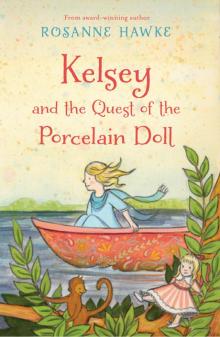 Kelsey and the Quest of the Porcelain Doll
Kelsey and the Quest of the Porcelain Doll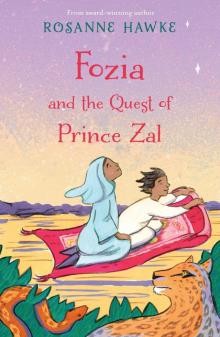 Fozia and the Quest of Prince Zal
Fozia and the Quest of Prince Zal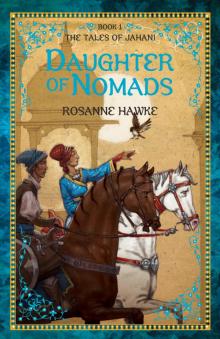 Daughter of Nomads
Daughter of Nomads The Truth About Peacock Blue
The Truth About Peacock Blue Taj and the Great Camel Trek
Taj and the Great Camel Trek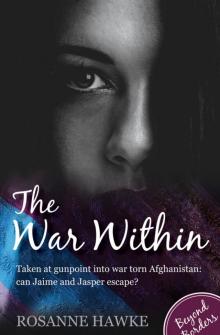 The War Within
The War Within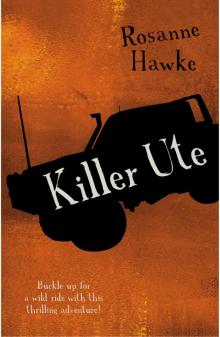 Killer Ute
Killer Ute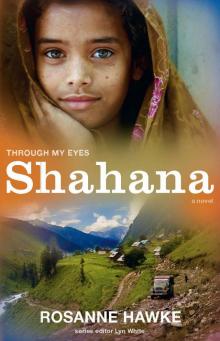 Shahana
Shahana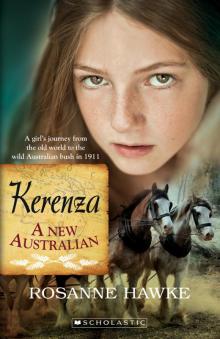 Kerenza: A New Australian
Kerenza: A New Australian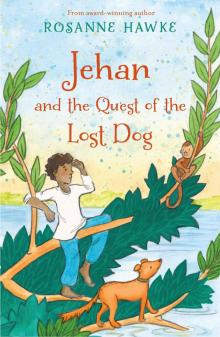 Jehan and the Quest of the Lost Dog
Jehan and the Quest of the Lost Dog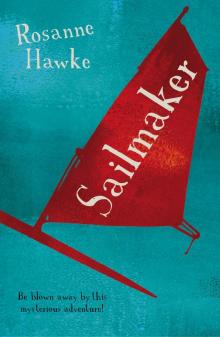 Sailmaker
Sailmaker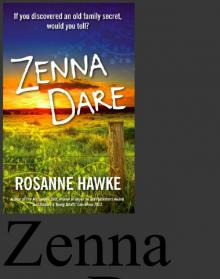 Zenna Dare
Zenna Dare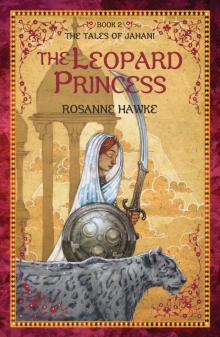 The Leopard Princess
The Leopard Princess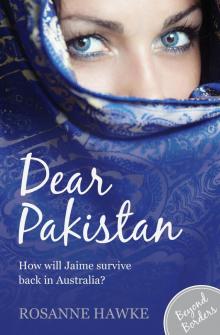 Dear Pakistan
Dear Pakistan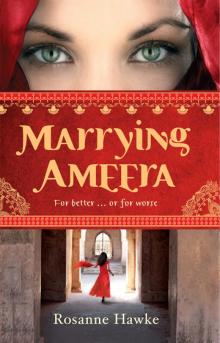 Marrying Ameera
Marrying Ameera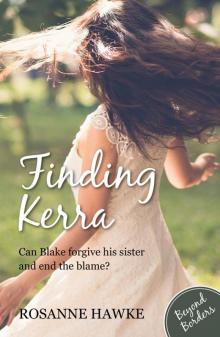 Finding Kerra
Finding Kerra Spirit of a Mountain Wolf
Spirit of a Mountain Wolf